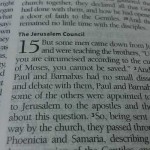The Jerusalem Council – Introduction

In Acts 15, Luke records an instance in which Paul, Barnabas, and others in the church in Antioch are opposed by some other believers who had come from Jerusalem. What is the cause of the opposition?
But some men came down from Judea and were teaching the brothers, “Unless you are circumcised according to the custom of Moses, you cannot be saved.” (Acts 15:1 ESV)
These brothers – they were Christians – were teaching the church in Antioch that circumcision was necessary for salvation. This caused a huge debate and discussion (Acts 15:2). Eventually, Paul and Barnabas decided to take the question to the apostles and elders of the church in Jerusalem.
What follows, then, is often called “the Jerusalem Council.” How important is this meeting and this section of Scripture? Well, this is what John Polhill says in his commentary on Acts (The New American Commentary; Nashville: Broadman Press, 2001):
Acts 15:1-35 stands at the very center of the book. Not only is this true of its position halfway through the text, but it is also central in the development of the total plot of the book… The stage was set for Paul’s mission to the heart of the Greco-Roman world as the missionary to the Gentiles. There remained only one final hurdle, and that was the agreement of the whole church on the Gentile mission. (pg 320 – italics in original)
Furthermore, Polhill says, “The debate in Jerusalem revolved around the issue of how Gentiles were to be accepted into the Christian fellowship.” (pg 321 – italics in original)
Similarly, in his article on “Jerusalem” in The Dictionary of Paul and His Letters, Stein states:
[T]he results of the Jerusalem Council were a clear victory for Paul. The church with one voice recognized that salvation was by grace alone. The Gentiles needed only believe. Those who were troubling them and demanding their circumcision were refuted. (Edited by Gerald F. Hawthorne, Ralph P. Martin, Daniel G. Reid; Downers Grove: InterVarsity, 1993, pg 469)
So, according to at least these two scholarly opinions (and many more if study the literature), the Jerusalem Council represents a turning point. It is a turning point historically for the church in deciding to accept Gentiles into Christian fellowship without their being circumcised. That is, the church finally recognized that no one needs to be circumcised in order to be saved. Also, textually, the Jerusalem Council serves as a turning point in the narrative of the early church. At this point, the focus moves from the Jerusalem church (and Jewish Christians) to the Pauline mission to Gentiles.
But, do these conclusions actually align with the text and narrative of Acts? I don’t think so.
During the next few days, I hope to show that the so-called Jerusalem Council was one of several meetings of the church, and that it was not necessarily special in relation to the other meetings. In fact, nothing new was decided during the “Council.” Furthermore, I hope to show that the “Jerusalem Council” does not introduce the Gentile mission, and that the Gentile and Jerusalem churches are intertwined throughout the book of Acts.
Is this important? I think so. Perhaps I’ll talk about this in a later post.
What do you think?
2 Comments
Comments are closed. If you would like to discuss this post, send an email to alan [at] alanknox [dot] net.
Trackbacks/Pingbacks
- The Jerusalem Council – Literary Position | The Assembling of the Church - [...] I mentioned in a previous post (“The Jerusalem Council – Introduction“), I’m working through a series of posts on…
- The Jerusalem Council – The Decision | The Assembling of the Church - [...] writing about the so-called “Jerusalem Council” of Acts 15:1-35. (See my posts “The Jerusalem Council – Introduction” and “The…
- The Jerusalem Council – Reasons and Results | The Assembling of the Church - [...] posts about the so-called “Jerusalem Council” from Acts 15:1-35. (See my posts “The Jerusalem Council – Introduction,” “The Jerusalem…

I’m looking forward to hearing the rest of this! the “Jerusalem Council” is something I have heard a lot about in defense of church government and hierarchy so it will be interesting to read your thoughts on the subject!
Thanks!
Dan
I’m interested in “the rest of the story” too. My buddy and I are going through Acts and this Sunday we’re reading Acts 15 together. I’ve often wondered about the Jerusalem “council” too since I think it’s clear from reading the rest of the New Testament that this council did not settle the issue. Perhaps the commentators are viewing this chapter through their denominational lenses that hold “councils” in high regard.